Your search “Keep%20ethe%20eDeath%20ePenalty%abolished%20ein%20ethe%20ePhilippfines%20e%20e%20e%20e%20e%20e%20e%20e%20e%20e/page/com16501.content.olc.org/com/ref/collection/criminal/did/154 ”
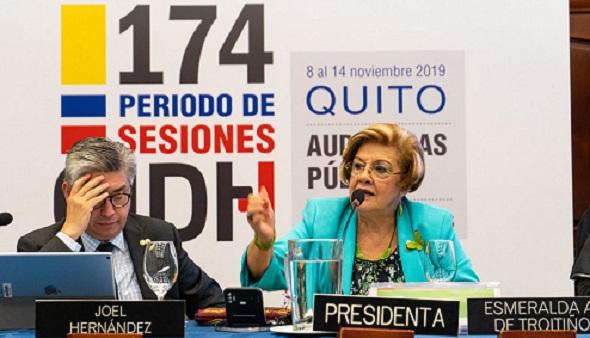
Article(s)
The Inter-American system commits to see the end of the death penalty
By World Coalition Against the Death Penalty, on 13 January 2020
In November 2019, Ecuador hosted a series of high level meetings of the Organisation of American States (OAS), including the Third Forum of the Inter-American Human Rights System and the 174th Period of Sessions of the Inter-American Commission on Human Rights (IACHR), during which abolition of the death penalty was on the agenda.
2020

Article(s)
Ten films to expose innocence on death row
By Laura Shacham - One for Ten, on 29 April 2013
One For Ten is a series of short documentary films telling the stories of innocent people who were on death row in the United States, with support from the World Coalition and several of its members.
2013
Innocence
United States
Article(s)
According to Taiwanese civil society, new President Tsai Ing-wen might relaunch debate on the abolition of the death penalty
By Marion Gauer, on 31 March 2016
Even though Taiwanese general mindset appears to be quite in favor of death penalty, Taiwanese civil society expects some changes to happen in the application of death penalty under the presidency of Tsai Ing-wen. In his article “Taiwan: Can Tsai Ing-Wen Change the Politics of Death?”, Michael Caster – graduate student at the Fletcher School of Law and Diplomacy at Tufts University, as well as human rights advocate and civil society consultant based in East Asia – quotes Executive Director of the Taiwan Alliance to End the Death Penalty, Lin Hsin-yi, on that controversial matter.
2016
Taiwan

Member(s)
Chaml (Non-Violent Non-Sectarian Lebanese Citizenly Youth)
on 30 April 2020
Mandate and goals : Spread the culture of non-violence, non-sectarianism and human rights and advocate for political/legal change that is relevant to our values. We have five principles: Non-sectarianism, Non-violence, Justice, Democracy, and Sovereignty. Kind of actions : – Raise awareness, protest, and lobby to pass the Lebanese Personal Status law – Document sectarian hate […]
2020
Lebanon

Member(s)
Communità di Sant’Egidio
on 30 April 2020
Sant’Egidio is a Christian community born in 1968, right after the second Vatican Council. An initiative of Andrea Riccardi, it was born in a secondary school in the centre of Rome. With the years, it has become a network of communities in more than 70 countries of the world. The Community pays attention to the […]
Italy

Member(s)
Abdorrahman Boroumand Center for the Promotion of Human Rights and Democracy in Iran
on 30 April 2020
Abdorrahman Boroumand Center previously know as Abdorrahman Boroumand Foundation Mandate and goals : Promoting universal human rights in Iran and documenting the violation of the right to life in the Islamic Republic of Iran Kind of actions : Creation of an online memorial to the victims of the violation of the right to life in […]
Iran (Islamic Republic of)
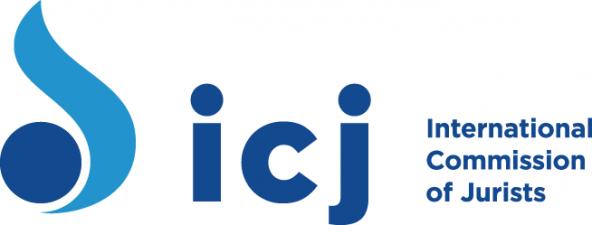
Member(s)
International Commission of Jurists
on 30 April 2020
The International Commission of Jurists (ICJ) is dedicated to promoting rule of law and advancement of human rights around the world. The ICJ statute provides: The Commission carries out activities at the global, regional, national and local level and in particular takes effective steps to: 1. Support and advance the Rule of Law and human […]
Switzerland

Member(s)
International Federation of ACATs (FIACAT)
on 30 April 2020
The International Federation of ACATs (Action by Christians for the Abolition of Torture), FIACAT, is an international non-governmental human rights organisation, set up in 1987, which works towards the abolition of torture and the death penalty. The Federation brings together some thirty national associations, the ACATs, present in four continents. FIACAT – representing its members […]
France

Article(s)
Call for tenders for the contracting of travel management services
By World Coalition Against the Death Penalty, on 15 June 2021
The World Coalition requires travel management services, on a non-exclusive basis, for World Coalition staff, members and partners.
2021
Article(s)
Training consultant
By World Coalition, on 21 January 2016
The World Coalition calls for applications for a consultant in charge of planning a training session in Sub-Saharan Africa.
2016
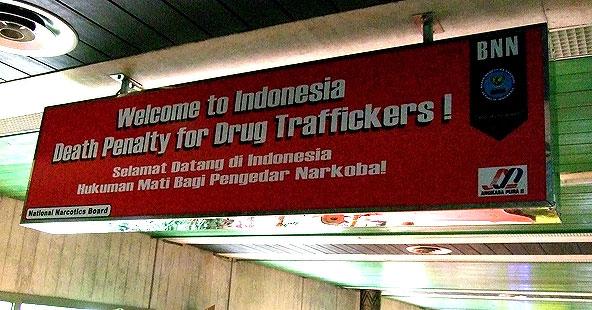
Article(s)
Indonesian executions on the rise as election looms
By Emile Carreau, on 10 December 2013
Executions have multiplied in Indonesia throughout 2013. World Coalition local member organization KontraS sees political motivations behind the end of a four-year moratorium.
2013
Indonesia
Indonesia
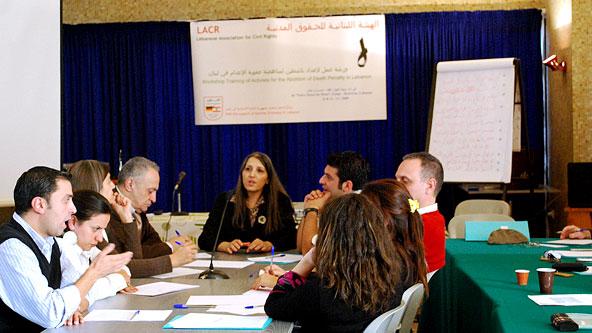
Article(s)
“Catastrophic” conditions on Lebanon’s death row
By Delphine Judith, on 31 May 2013
Ogarit Younan is a co-founder of the Lebanese Association for Civil Rights, which has just joined the World Coalition. She takes stock on the death penalty and abolitionist progress in Lebanon.
2013
Death Row Conditions
Lebanon
Article(s)
Call for tenders for printing, design and layout services
By Carlos Valera, on 7 July 2020
The World Coalition requires contracts for printing, design and layout services, visibility items and reprography for any publications that may be required, in addition to materials that may be required with these features.
2020
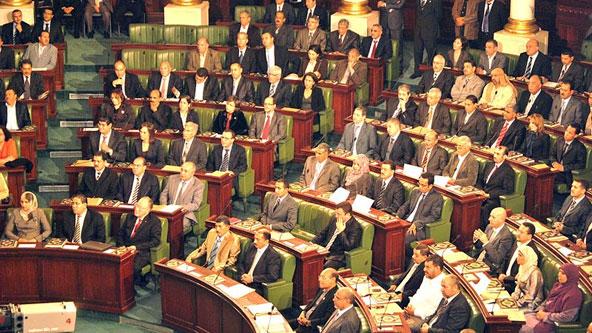
Article(s)
Tunisian Constitution enshrines right to life but upholds death penalty
By Delphine Judith, on 28 January 2014
After weeks of debates, Tunisia has adopted a new Constitution. As expected by local abolitionists, the National Constituent Assembly (NCA) passed a text allowing capital punishment on 26 January 2014.
2014
Moratorium
Tunisia
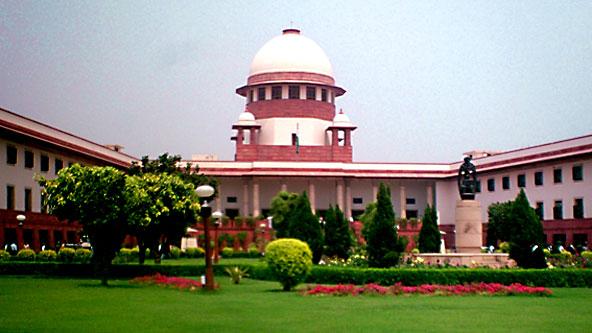
Article(s)
Indian ruling highlights importance of next World Day
By Emile Carreau, on 3 February 2014
On 21 January, India’s Supreme Court formally banned the execution of mentally ill prisoners and in doing so highlighted why this year’s World Day against the Death Penalty, which is dedicated to issues of mental health, is so important.
2014
India
Intellectual Disability
Mental Illness
Article(s)
Small Grant for Activities in the Caribbean
By World Coalition Against the Death Penalty, on 29 August 2019
Call for action on the abolition of the death penalty in Barbados and the Eastern Caribbean States launched by the Greater Caribbean for Life and the World Coalition Against the Death Penalty
2019
Barbados
Article(s)
Évaluation finale externe d’un projet de 36 mois sur l’abolition de la peine de mort en Afrique
By FIACAT, on 13 March 2018
1. OrganisationLa Fédération internationale de l’Action des chrétiens pour l’abolition de la torture, la FIACAT, est une organisation internationale non gouvernementale de défense des droits de l’homme, créée en 1987, qui lutte pour l’abolition de la torture et de la peine de mort. La Fédération regroupe une trentaine d’associations nationales, les ACAT, présentes sur quatre […]
2018
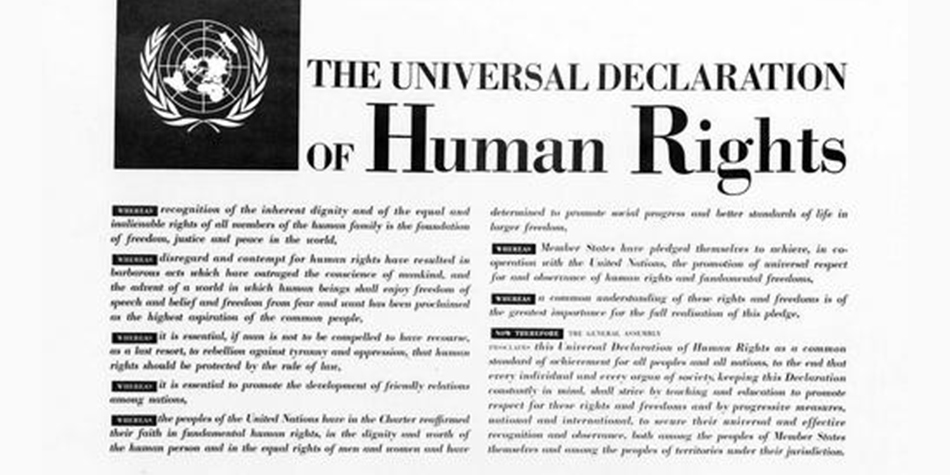
Article(s)
Statement on the occasion of the International Human Rights Day
By World Coalition Against the Death Penalty, on 10 December 2020
Humanity and the global human rights movement, including the World Coalition Against the Death Penalty, are celebrating the 72nd anniversary of the adoption of the Universal Declaration of Human Rights on 10 December 1948. This day has been commemorated by the United Nations as International Human Rights Day.
2020
Moratorium
Article(s)
Program Officer
By PGA, on 22 February 2016
PGA is recruiting a Programme Officer for its Hague office.
2016
Article(s)
10.10.10 World Day Against the Death Penalty – USA special
on 6 August 2010
On 10 October 2010, the World Day Against the Death Penalty will focus on the USA. There are two months left to prepare and promote the events planned around the world on the big day.
2010
Cruel, Inhuman and Degrading Treatment and Punishment
United States
Article(s)
Live from death row
on 25 February 2010
The 180 members of the public who had gathered to view the film Manners of dying had an opportunity to witness a discussion between Mumia Abu-Jamal and his lawyer Robert Bryan.
2010
Switzerland
United States
Article(s)
8 Demands for Beijing
on 21 June 2007
By welcoming the Olympics in 2008, China committed itself to improving its human rights situation. Anxious to remind Chinese authorities of their commitments, nine French associations, five of which are members of the World Coalition, created the China 2008 Olympic Games Collective.
2007
China
Article(s)
Iranian World Coalition member receives Martin Ennals award
on 23 May 2009
A group of prestigious human rights organisations have chosen to honour Emad Baghi, the founder of the Association for the Right to Live.
2009
Iran (Islamic Republic of)
Article(s)
Every voice counts to oppose the death penalty in California
on 24 June 2009
Abolitionists are given a unique opportunity to voice their position as Californian authorities seek comments from the public on the review of the lethal injection process.
2009
Cruel, Inhuman and Degrading Treatment and Punishment
United States
Article(s)
African Great Lakes Coalition gets stronger
on 6 November 2009
The group, which brings together more than 30 member organisations from four countries, established itself as a formal body and launched its website on World Day Against the Death Penalty.
2009
Burundi
Democratic Republic of the Congo
Juveniles
Rwanda
Uganda
Document(s)
Race Discrimination and the Legitimacy of Capital Punishment: Reflections on the Interaction of Fact and Perception
By George Woodworth / David C. Baldus / DePaul Law Review, on 1 January 2004
2004
Article
United States
More details See the document
The authors analyze data concerning race discrimination in capital sentencing and data regarding how the public perceives this issue. They conclude that race discrimination is not an inevitable feature of all death penalty systems. Before Furman v. Georgia was decided in 1972, widespread discrimination against black defendants marred the practice of capital punishment in America. According to studies cited by the authors, race-of-defendant discrimination has lessened since Furman. However, race-of-victim discrimination remains a significant factor in sentencing; defendants with white victims are at a significantly higher risk of being sentenced to death and executed than are defendants whose victims are black, Asian, or Hispanic. From 1976 to 2002, the proportion of white-victim cases among all murder and non-negligent manslaughter cases has ranged between 51% and 56%. However, 81% of executed defendants had white victims. Polling data indicate that the general public perceives only one form of race discrimination in the use of the death penalty – race-of-defendant discrimination – and that the public and elected officials may see racial discrimination as inevitable in the criminal justice system. Race of victim discrimination is a pervasive problem in the death penalty system. However, race discrimination is not inevitable. If serious controls were enacted to address this problem (such as those imposed in a few states) a fairer system could result.
- Document type Article
- Countries list United States
- Themes list Discrimination,
Document(s)
Death Penalty in Pakistan
By Justice Project Pakistan, on 10 October 2022
2022
NGO report
Pakistan
More details See the document
The implementation of capital punishment has seen substantial shifts over the course of the past decade. During the period from the end of a moratorium on executions in December 2014 to August 2019, an estimated 1,800 death sentences were imposed across the entire court system and 520 people were executed. Various amendments to Pakistan’s criminal law over the past several decades have resulted in a list of 33 offenses, most of which are far removed from the definition of the “most serious crimes” under international law. A full list of offences is attached at the end of the report.
- Document type NGO report
- Countries list Pakistan
Document(s)
Deterrence and the Death Penalty Guide
By The Death Penalty Project, on 1 November 2022
2022
NGO report
Public Opinion
More details See the document
The most common justification for the retention of the death penalty among the minority of states that continue to sentence to death and execute individuals who are found guilty of committing certain serious offences is a belief that this punishment has a unique deterrent effect. The Death Penalty Project produced this resource on deterrence and the death penalty.
- Document type NGO report
- Themes list Public Opinion
Document(s)
Ghosts of Executions Past: A Case Study of Executions in South Carolina in the Pre-Furman Era
By John H. Blume, Samuel F. Leibowitz, on 1 September 2022
2022
Academic report
Cruel, Inhuman and Degrading Treatment and Punishment
United States
More details See the document
The protracted and (somewhat) ongoing debate over whether lethal injection—in some or all of its forms—is cruel and unusual punishment under the Eighth Amendment is the newest variation on the question of whether a particular form of capital punishment is inhumane and cruel. The history of capital punishment in the United States over the last two centuries has been punctuated by attempts to find less painful and gruesome ways to kill persons society has condemned to die. Ironically, at least from a historical perspective, some recent executions have seen condemned inmates or their attorneys elect some of the older methods, i.e., electrocution, or offer, as a potentially less painful alternative, the firing squad or death by lethal gas. And some states, including the main subject of this article, have resurrected electrocution and the firing squad because of a claimed inability or difficulty in obtaining execution drugs. In this article, the authors trace the history of execution methods in the pre-modern era of capital punishment (before 1972), primarily in South Carolina, pointing out the often-intractable problems with their implementation process (including specific “botches”), and then address other aspects of executions that have relevance to the current debate about the wisdom and efficacy of retaining the “modern” American death penalty in the twenty-first century.
- Document type Academic report
- Countries list United States
- Themes list Cruel, Inhuman and Degrading Treatment and Punishment
Document(s)
Examining Public Opinion about Crime and Justice: A Statewide Study
By Eric Johnston / Barbara Sims / Criminal Justice Policy Review, on 1 January 2004
2004
Article
United States
More details See the document
As noted by Flanagan (1996), public opinion polls about crime and justice can act as a social barometer providing important data to policy makers regarding what the public is willing, or is not willing, to accept when it comes to proposed legislation and/or intervention programming. This paper reports findings from the 2001 Penn State Poll, a random telephone survey of Pennsylvanians, 18 years of age or older, in which citizens were asked about their attitudes toward and perceptions of such issues as fear of crime, capital punishment, the most important goal of prison, and where they would most like to see their tax dollars spent (building more prisons vs. early intervention programs with troubled youth). Significant differences were found within certain demographic groups across these sets of questions, and in a predictive model, gender, race/ethnicity, and education had a greater impact on citizens’ support for capital punishment than did their fear of crime. Overall, findings suggest that the public is not as punitive as it is sometimes believed to be by legislators and policy makers.
- Document type Article
- Countries list United States
- Themes list Public opinion,
Document(s)
Matters of Judgment
By National Law University, New Delhi Press, on 1 January 2017
2017
Academic report
More details See the document
The aim of this study was to explore the opinions of former judges of the Supreme Court of India on the death penalty and more generally on the state of India’s criminal justice system as far as it was relevant to the death penalty. The study did not focus on the position that former judges took on the death penalty but was instead interested in understanding the reasons they saw for both abolition and retention. In addition to exploring those reasons, the study also wanted to map the understanding of the ‘rarest of rare’ doctrine among former judges and get insights into the manner in which judicial discretion is exercised in death penalty cases. Finally, we wanted to locate all these discussions on the death penalty in the context of an evaluation of the criminal justice system by the former judges.
- Document type Academic report
- Themes list Networks, Death Penalty, Country/Regional profiles,
Document(s)
Death sentences and executions in 2009
By Amnesty International, on 1 January 2010
2010
NGO report
arfresMore details See the document
This document summarizes Amnesty International’s global research on the use of the death penalty in 2009. More than two-thirds of the countries of the world have abolished the death penalty in law or in practice. While 58 countries retained the death penalty in 2009, most did not use it. Eighteen countries were known to have carried out executions, killing a total of 714 people; however, this figure does not include the thousands of executions that were likely to have taken place in China, which again refused to divulge figures on its use of the death penalty. For an update to this document please see http://www.amnesty.org/en/library/info/ACT50/005/2010/en
- Document type NGO report
- Themes list Statistics,
- Available languages أحكام الإعدام وعمليات الإعدام في عام 2009CONDAMNATIONS À MORT ET EXÉCUTIONS RECENSÉES EN 2009CONDENAS A MUERTE Y EJECUCIONES 2009
Document(s)
Public Opinion on the Death Penalty in China: Results from a General Population Survey Conducted in Three Provinces in 2007/08
By Shenghui Qi / Dietrich Oberwittler / Max Planck Institute for Foreign and International Criminal Law, on 1 January 2008
2008
Article
China
More details See the document
The present project is concerned with the significant role that public opinion plays in the debate surrounding the death penalty and criminal policy in the People’s Republic of China, including possible public reaction to any planned abolishment of the death penalty. How is public opinion on the death penalty exhibited in China? What influence does public opinion on the death penalty have on legislative and judicial practice in China? The principal goal of the project is to analyze the links that exist between public opinion, criminal policy, legislation and legal practice, and to initiate attitudinal changes amongst political and legal actors as well as the public at large. A further objective is to guide Chinese criminal law reform, particularly with regard to a possible reduction in the number of capital offences, against the background of the ratification of the International Covenant on Civil and Political Rights
- Document type Article
- Countries list China
- Themes list Public opinion,
Document(s)
The Death Penalty In Egypt: Theoretical and Practical Study in the Light of Islamic Shariah and International Human Rights Law
By Dr. Mohamed Al Ghamry / Arab Penal Reform Organization APRO, on 1 January 2008
NGO report
arMore details See the document
This study addresses the subject of the “death Penalty in Egypt”, which is an applied theoretical study done in light of the principles of the Islamic law and provisions concerning international human rights law. Egyptian Penal Code No. 58/1937 is the modern penal code that still retains the death penalty in spite of its cruelty and strictness and impossibility of reforming its results or amending them. The laws governing the death penalty in Egypt are considered one of the most deterrent penalties at all levels, general and private, that ensures combating crimes and preserving the interests of society, as well as ensuring stability in spite of the presence of an increasing international inclination led by the United Nations and some international NGOs headed by Amnesty International to abolish the Death Penalty given the difficulty to reconcile between this penalty and obligation to respecting human rights.There is no doubt that the intention to study the legislative system of the death penalty in Egypt, with the purpose of the determination of legality of this penalty and the demonstration of the feasibility of its application for society, is difficult without identifying all the roles and functions caused by the death penalty over successive legal ages in Egypt. When the criminal legislator passes new laws that address crimes in Egypt, in his appreciation, to achieve deterrence and for the purpose of combating crime, the legislator does nothing new in society. The work of the legislature work is a product of an interaction between the proposed legislative articles to solve the realistic problems from which society suffers in a historical moment on the one hand, and the cultural, social, religious, legal and political heritage coming to our society from abroad, may play a key role in the determination of the content of the proposed legislative text in the context of the mutual influence between cultures. In this context, this study begins by an introductory chapter entitled “The Historical Origins of the Death Penalty in Egypt” in which we tried to pin the Egyptian penal legislation to its origin by studying the position of death penalty and its evolution in society. By identifying the historical origin of the Death Penalty in Egypt, we then present an objective view on the future of death penalty in Egypt between retention and abolition. —- Please find document at bottom of web page.
- Document type NGO report
- Themes list Religion ,
- Available languages عقوبة الإعدام في مصر دراسة نظرية وتطبيقية في ضوء مبادئ الشريعة الإسلامية وأحكام القانون الدولي لحقوق الإنسان
Document(s)
Geometrical Justice: The Death Penalty in America
By Scott Phillips and Mark Cooney, on 12 October 2022
2022
Book
United States
More details See the document
In their new book, released in the Summer of 2022, University of Denver criminology and sociology professor Scott Phillips and University of Georgia sociologist Mark Cooney apply the concept of “social geometry,” developed in the 1970s by sociologist Donald Black, to analyze outcomes of capital cases. After reviewing extensive data collected in connection with the landmark Baldus Study of capital sentencing in Georgia and from the national Capital Jury Project, they conclude that the sentencing outcomes in the cases in those databases support key principles of Black’s theory: the higher the social status of the victim and the lower the social status of the defendant, the more likely a death sentence will be imposed.
- Document type Book
- Countries list United States
Document(s)
Life, Death and the Crime of Crimes: Supreme Penalties and the ICC Statute
By William A. Schabas / Punishment and Society, on 1 January 2000
2000
Article
More details See the document
The attitude of international law and practice to supreme penalties has evolved enormously over the past half-century. At Nuremberg, in 1946, capital punishment was imposed upon Nazi war criminals. But at the Rome Conference in 1998, when the international community provided for the establishment of the International Criminal Court, not only was capital punishment excluded, the text also limited the scope of life imprisonment. These changes were driven principally by evolving norms of international human rights law. The first changes became apparent in the early work of the International Law Commission on the Code of Crimes against the Peace and Security of Mankind, during the 1950s. When criminal prosecution returned to the international agenda, in the late 1980s and early 1990s, there was widespread agreement to exclude capital punishment. But at the Rome Conference, a relatively small and geographically isolated group of States made an aggressive attempt to defend capital punishment. Ultimately unsuccessful, their efforts only drew attention to a growing rejection of both capital punishment and life imprisonment in international and national legal systems
- Document type Article
- Themes list Networks,
Document(s)
Showing Remorse: Reflections on the Gap between Expression and Attribution in Cases of Wrongful Conviction
By Richard Weisman / Canadian Journal of Criminology and Criminal Justice, on 1 January 2004
2004
Article
Canada
More details See the document
This paper seeks first to show that persons who are convicted of crimes can be perceived as either remorseful or as lacking in remorse. This division establishes a moral hierarchy that has profound implications for the characterization and disposition of persons who are so designated. Second, using both Canadian and American cases, it looks at how inclusion in the category of the unremorseful affects the characterization and disposition of those who have been wrongfully convicted. Finally, it suggests that remorse is a major site of conflict between persons who are wrongfully convicted and officials within the criminal justice system, conflict that involves the use of institutional pressure to encourage the expression of remorse, on the one hand, and the mobilization of individual resources to resist those expressions.
- Document type Article
- Countries list Canada
- Themes list Networks,
Document(s)
Let’s Make a Deal: Waiving the Eighth Amendment by Selecting a Cruel and Unusual Punishment
By Jeffrey L. Kirchmeier / Connecticut Law Review, on 1 January 2000
2000
Article
United States
More details See the document
This Article addresses the issue of whether a criminal defendant may waive the Eighth Amendment prohibition on cruel and unusual punishments by selecting an unconstitutional punishment over a constitutional punishment. The Article begins with a discussion of the Supreme Court’s Eighth Amendment jurisprudence, followed by a discussion of areas where the Court has allowed defendants to waive Eighth Amendment protections in various contexts. Then, the Article discusses court decisions that have addressed whether one may waive Eighth Amendment protections by choosing a cruel and unusual punishment. Generally, this issue has arisen in three contexts: (1) where defendants are given the punishment option of banishment; (2) where sex offenders are given the punishment option of castration; and (3) where capital defendants are given an execution method option that violates the constitution. The Article explains that at least in the context of punishment type, a defendant’s choice should not waive Eighth Amendment protections. First, the ban on cruel and unusual punishments is a right that differs significantly from other constitutional criminal rights because it serves a broad societal purpose. Second, the waiver of this right differs from the waiver of other criminal rights because such waivers do not benefit the individual or society. Finally, to allow such waivers would strip the Eighth Amendment of meaning by permitting legislatures to create any punishment options it desired. Therefore, the Article concludes that the Eighth Amendment ban on cruel and unusual punishments cannot be waived by an individual.
- Document type Article
- Countries list United States
- Themes list Cruel, Inhuman and Degrading Treatment and Punishment,
Document(s)
Global Prison Trends 2018
By Penal Reform International, on 1 January 2018
2018
NGO report
More details See the document
- Document type NGO report
- Themes list Trend Towards Abolition, Sentencing Alternatives, Death Penalty, Statistics,
Document(s)
Handbook of Forensic Psychiatric Practice in Capital Cases
By The Death Penalty Project / Nigel Eastman / Richard Latham / Marc Lyall / Sanya Krljes, on 1 January 2018
Working with...
More details See the document
The Death Penalty Project and Forensic Psychiatry Chambers have released two new publications, together providing an authoritative guide on the application of mental health law in capital cases. The resources respond to the knowledge that, in many countries that retain the death penalty, mental health issues are not being sufficiently addressed by the courts, leading to miscarriages of justice and putting vulnerable individuals at risk.This Handbook guides the reader through the role of the forensic psychiatrist in criminal proceedings and key principles of mental health law.
- Document type Working with...
- Themes list Death Penalty,
Document(s)
Restraints on Death Penalty in Europe: A Circular Process
By Stefano Manacorda / Journal of International Criminal Justice, on 1 January 2003
2003
Article
More details See the document
That the European area is a zone free of capital punishment is the result of a complex process of restraints that has evolved over the last 50 years. Domestic, regional and universal international law, as well as certain components within each level, have influenced each other to produce a dynamic, circular movement towards abolition. Starting from the internal level, restraints on the death penalty rose up to the regional and universal levels, and then descended back down into domestic law. This process, however, has not produced a completely closed circle, and certain countries in Europe retain legislation permitting recourse to the death penalty for certain crimes, especially war crimes and, according to recent interpretations, criminal offences related to terrorist activity. Extradition or other administrative mechanisms of expulsion also illustrate potential disjunctions in the circle, as they may allow persons to be transferred to retentionist countries. Even though the legislative framework has significantly evolved in the last few years, the dominant role played by political evaluations creates new fissures in the abolitionist circle. Only recently have new abolitionist perspectives emerged from the ‘right of interference’ in foreign death penalty cases, which some countries try to exercise when their own nationals are involved.
- Document type Article
- Themes list Networks,
Document(s)
Capital Punishment in Context
By Death Penalty Information Center, on 8 September 2020
2020
Campaigning
More details See the document
Capital Punishment in Context contains several cases of individuals who were sentenced to death in the United States. Each case presents a narrative account of the individual’s crime, trial and punishment, along with guidelines for analysis, discussion and further research on issues raised by the case. The narratives are supplemented by resources such as original police reports from the homicide investigation and transcripts of testimony from witnesses. After reading the case, you can further explore issues by following a series of links to new information. Each case, along with the related materials, delineates a path through the criminal justice system. At every stage of the process, questions are raised about how the system works. These questions can lead to an analysis of key topics, such as the quality of legal representation for criminal defendants, the risk of wrongful convictions, the role of capital jurors, judicial independence, and the role that race may play in the criminal justice system.
- Document type Campaigning
- Themes list Networks,
Document(s)
Legislators’ Opinions on the Death Penalty in Taiwan
on 24 March 2022
2022
NGO report
Public Opinion
Taiwan
zh-hantMore details See the document
In 2021, The Death Penalty Project and the Taiwan Alliance to End the Death Penalty (TAEDP) commissioned Professor Carolyn Hoyle at the University of Oxford and Professor Shiow-duan Hawang at Soochow University, Taipei to carry out a study exploring Taiwanese legislators’ attitudes towards capital punishment.
The study reveals that the majority of Taiwan’s legislators would like to see the death penalty abolished. The risk of wrongful convictions, the abuse of human rights and a recognition that the death penalty has no unique deterrent effect, were the primary reasons cited for supporting abolition. Additionally, a majority of legislators interviewed expressed fairly low levels of trust in the Taiwanese criminal justice system, with doubts raised over its ability to offer adequate safeguards to individuals facing capital trials.
Key findings:
– 61% of legislators interviewed are in favour of abolishing the death penalty
– 39% of legislators interviewed are in favour of retaining the death penalty, but only one legislator was strongly in favour
– 71% of retentionists and 65% of abolitionists asserted that wrongful convictions ‘sometimes’ occurred
– Only 11% of legislators interviewed thought that wrongful convictions ‘rarely’ occur
– All legislators interviewed expressed a preference for social justice measures, such as poverty reduction, over increased executions when asked to rank a range of policies aimed at reducing violent crime
- Document type NGO report
- Countries list Taiwan
- Themes list Public Opinion
- Available languages 台灣立法委員對死刑 之意見調查

Member(s)
Prison Insider
on 30 April 2020
Prison Insider is a French independent NGO. Prison Insider’s main mission is to raise awareness about the conditions of detention and to promote the rights and dignity of people deprived of liberty, everywhere in the world. To reach its aims, the organisation primarily operates an information website. Prison Insider’s vocation is to make available and […]
2020
France

Member(s)
Free Mumia! French Support Group
on 30 April 2020
Founded in 1995, the French collective “Libérons Mumia” brings together about a hundred organisations and public authorities: human rights associations, trade unions, political parties, local and regional collectives and local authorities. His objective is to obtain a new trial allowing the Black American journalist Mumia to defend his innocence and regain his freedom. Mumia Abu-Jamal […]
France
Document(s)
Portuguese : Homofobia do Estado: Uma pesquisa mundial sobre legislações que proíbem relações sexuais consensuais entre adultos do mesmo sexo
By Daniel Ottosson / International Lesbian, Gay, Bisexual, Trans and Intersex Association (ILGA), on 8 September 2020
2020
NGO report
enfresMore details See the document
O propósito deste relatório anual sobre a Homofobia do Estado, expresso desde sua primeira edição, em 2007, é revelar e denunciar os países que, no século 21, negam às pessoas LGBTI os direitos humanos mais fundamentais: o direito à vida e à liberdade, na esperança de que, a cada ano, mais e mais países abandonem a ―comunidade‖ dos países homofóbicos.Em comparação com o relatório do ano passado, em que relacionamos os 77 países que perseguiam as pessoas com base em sua orientação sexual, no presente relatório você encontrará ‗apenas‖ 76 países nesta mesma lista, incluindo os cinco ―infames‖,que condenam as pessoas à morte com base em sua orientação sexual: Irã, Mauritânia, Arábia Saudita, Sudão e Iêmen (e algumas regiões da Nigéria e da Somália). Um país a menos, se comparado ao relatório de 2009, pode parecer um avanço insignificante, até nos darmos conta de que ele compreende 1/6 da população humana.
- Document type NGO report
- Themes list Homosexuality,
- Available languages State-sponsored Homophobia: A world survey of laws prohibiting same sex activity between consenting adultsHomophobie d'État: Une enquête mondiale sur les lois qui interdisent la sexualité entre adultes consentants de même sexeHomofobia de Estado: Un informe mundial sobre las leyes que prohiben la actividad homosexual con consentimiento entre personas adultas

Member(s)
Conférence Internationale des Barreaux
on 30 April 2020
The International Bar Association Conference (Conférence internationale des barreaux – CIB) was founded by representatives of 24 bar associations of countries that share both the French language and a common judicial tradition. It is now composed of 83 members. The CIB’s objective is to create a cooperation structure between them. It groups together associations that […]
2020
France
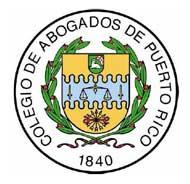
Member(s)
Colegio de Abogados y Abogadas de Puerto Rico
on 30 April 2020
The Puerto Rico Bar Association (Colegio de Abogados y Abogadas de Puerto Rico) represents all the attorneys in Puerto Rico, and has historically taken a very active role in the public debate. Since 2006 the Bar Association has been part of the World Coalition under the umbrella of the Puertorican Coalition Against the Death Penalty, […]
Puerto Rico
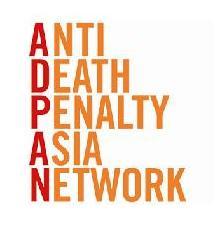
Member(s)
Anti-Death Penalty Asia Network (ADPAN)
on 30 April 2020
The Anti-Death Penalty Asia Network (ADPAN) was founded in Hong Kong on the World Day against the Death Penalty in 2006. In 2014, at its first General Meeting in Taipei, Taiwan, Anti-Death Penalty Asia Network (ADPAN) members approved ADPAN’s Constitution, and ADPAN’s first Executive Committee was elected. ADPAN, an independent Asia-Pacific network committed to working […]
Malaysia

Member(s)
Association Marocaine des Droits Humains (AMDH)
on 30 April 2020
Association marocaine des droits humains (AMDH) works towards safeguarding human dignity and for the respect, defence and promotion of human rights. Convinced of the universal nature of these rights, the AMDH bases its action on the international agreements which defend them. It campaigns for them to be respected in the political, civil, economic, social and […]
Morocco
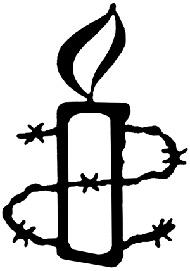
Member(s)
Amnesty International (AI)
on 30 April 2020
Amnesty International (AI) is a worldwide voluntary activist movement working for human rights. It is independent of any government, political ideology, or religious creed, economic interest or religion. It does not support or oppose any government or political system, nor does it support or oppose the views of the victims whose rights it seeks to […]
United Kingdom

Member(s)
Belarusian Helsinki Committee
on 30 April 2020
Founded in 1995, the National Human Rights Public Association “Belarusian Helsinki Committee” is one of the oldest human rights defenders organizations in Belarus. The list of its founders includes the nation’s most prominent leaders such as Vasil’ Bykau, Sviatlana Alexievich (Nobel prize in literature 2015). BHC sees as its main objective creating of civic context, […]
Belarus
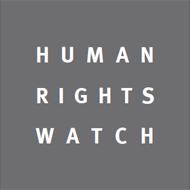
Member(s)
Human Rights Watch
on 30 April 2020
Human Rights Watch is a nonprofit, nongovernmental human rights organization made up of more than 275 staff members around the globe. Its staff consists of human rights professionals including country experts, lawyers, journalists, and academics of diverse backgrounds and nationalities. Human Rights Watch is known for its accurate fact-finding, impartial reporting, effective use of media, […]
France

Member(s)
HURILAWS
on 30 April 2020
HURILAWS began operations in 1997 as a specialist provider of human rights legal services and a purveyor of skills in the legal aspects of transition management. Today HURILAWS is also a public policy think tank working towards attainment of development, human rights and good governance. In particular, HURILAWS is the driver of the Multi-Sector Law […]
Nigeria
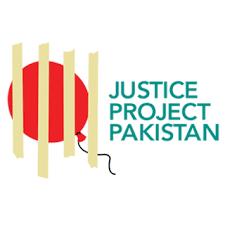
Member(s)
Justice Project Pakistan (JPP)
on 30 April 2020
Justice Project Society, commonly referred to as Justice Project Pakistan (JPP), represents the most vulnerable Pakistani prisoners facing the harshest punishments at home and abroad, including those facing the death penalty, mentally ill prisoners, juvenile prisonners, women, victims of police torture, and overseas Pakistani prisoners. JPP was the winner of the 2016 Franco-German Human Rights […]
Pakistan

Member(s)
Réseau d’alerte et d’intervention pour les droits de l’Homme (RAIDH)
on 30 April 2020
The Alert and Intervention Network for Human Rights (Réseau d’alerte et d’intervention pour les droits de l’Homme (RAIDH) aims to organise, finance and support any work, initiatives, measures, ideas or discussions which aim to defend and promote human rights (particularly civil and political rights, economic, social and cultural rights, international humanitarian rights, rights for refugees, […]
France
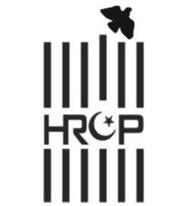
Member(s)
Human Rights Commission of Pakistan
on 30 April 2020
Founded in 1986 and registered in 1987, the Human Rights Commission of Pakistan (HRCP) is an independent, democratic, nonpartisan organization committed to supporting human rights in the country. Over the last three decades, HRCP has worked for women’s empowerment and gender equality, the rights of religious minorities, rule of law and access to justice, democratic […]
Pakistan

Member(s)
The Human Rights Centre “Viasna”
on 30 April 2020
The Human Rights Centre “Viasna” is a non-governmental human rights organization active since 1996. It is a nation-wide NGO with a central office in Minsk and a dozen local offices across the country. Viasna has about 200 members. In 2003, the Supreme Court groundlessly cancelled the registration of Viasna for its participation in the observation […]
Belarus

Member(s)
Ligue des droits de l’Homme
on 30 April 2020
Founded in 1898 during the Dreyfus affair, the League for Human Right (LDH) has a rich history thanks to a century of activism and attentive monitoring of all major contemporary issues. Originally, its mandate was to defend an innocent man, victim of anti-Semitism and reason of state, but the LDH expanded its actions to include […]
France
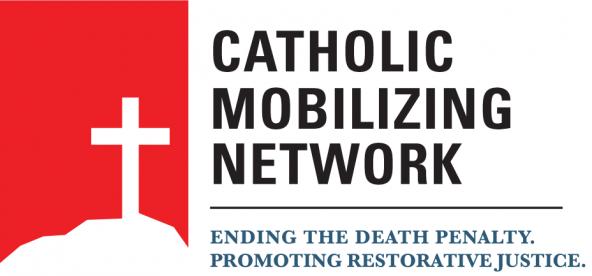
Member(s)
Catholic Mobilizing Network
on 30 April 2020
Catholic Mobilizing Network is a national organization working in close collaboration with the United States Conference of Catholic Bishops (USCCB) and living the mission of the Congregation of St. Joseph. Catholic Mobilizing Network (CMN) proclaims the Church’s pro-life teaching and prepares Catholics for informed involvement in the public debate to end the death penalty and promote […]
United States

Member(s)
Death Penalty Focus
on 30 April 2020
Death Penalty Focus (DPF) is a non-profit advocacy organization dedicated to the abolition of capital punishment in the United States through public education; grassroots organizing and political advocacy; media outreach; and domestic and international coalition building. With 150,000 members and supporters nationwide, DPF is governed by a volunteer Board of Directors comprised of renowned political, […]
United States

Member(s)
Journey of Hope… From Violence to Healing
on 30 April 2020
“Journey of Hope…from Violence to Healing is an organisation led by murder victim family members joined by death row family members, family members of the executed, the exonerated, and others with stories to tell, that conducts public education speaking tours and addresses alternatives to the death penalty. Every year, the organisation arranges a Journey of […]
United States
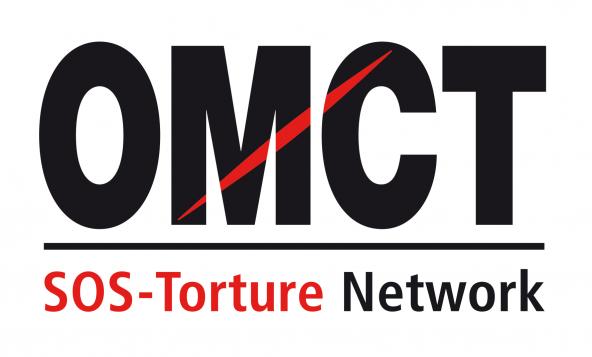
Member(s)
Organisation Mondiale Contre la Torture (OMCT)
on 30 April 2020
The OMCT is an independent, non-partisan, non-sectarian, Swiss international non-governmental organisation, founded in Geneva in 1985. It is today the leading global civil society network against torture including more than 200 local member organisations operating in over 90 countries around the world. Driven by the needs of its SOS-Torture Network members, the OMCT engages in […]
Switzerland

Member(s)
Palestinian Center for Human Rights
on 30 April 2020
The Palestinian Centre for Human Rights (PCHR) is an independent Palestinian human rights organisation based in Gaza City. It enjoys Consultative Status with the ECOSOC of the United Nations and is an affiliate of the International Commission of Jurists (Geneva), the International Federation for Human Rights (Paris), the Euro-Mediterranean Human Rights Network (Copenhagen) and the […]
State of Palestine

Member(s)
People of Faith Against the Death Penalty
on 30 April 2020
People of Faith Against the Death Penalty (PFADP) is a nongovernmental organisation whose mission is to educate and mobilise faith communities to act to abolish the death penalty in the United States. Founded in 1994 in North Carolina, PFADP focuses its programs on organising among faith communities in the Southern United States, where most executions […]
United States

Member(s)
National Lawyers Guild (NLG)
on 30 April 2020
The National Lawyers Guild (NLG) is an association dedicated to the need for basic and progressive change in the structure of the US political and economic system. It seeks to unite the lawyers, law students, legal workers and jailhouse lawyers of America in an organization that shall function as an effective political and social force […]
United States

Member(s)
Avocats Sans Frontières France
on 30 April 2020
The mandate and objectives of Avocats Sans Frontières France are: 1. Defending lawyers and defenders of human rights subject to threats or attacks of any kind because of their exercise professional; 2. Contribute to the effective implementation of human rights, universally recognized for ensuring the acces to any private person to a free and independent […]
France
Member(s)
Catholic Commission for Social Justice (CCSJ)
on 30 April 2020
Mandate and goals : To be a fearless united voice challenging injustice, awakening social consciousness and fostering integral development. We strive for this through: Social Justice Education and Advocacy; Promoting people-centred development, and; Working for the transformation of inequitable structures and systems Kind of actions : Promote and create opportunities, structures and programmes to achieve […]
Trinidad and Tobago

Member(s)
New Hampshire Coalition to Abolish the Death Penalty (NHCADP)
on 30 April 2020
New Hampshire Coalition to Abolish the Death Penalty (NHCADP) ‘s mandate and goals are to abolish the Death Penalty in the State of New Hamphire and the United States. To do so, they organise the following actions: direct lobbying of legislators, letter writing campaigns to legislators and media, vigils and other public demonstrations, public information […]
United States

Member(s)
Human Rights Association
on 2 May 2023
The Human Rights Association (İnsan Hakları Derneği) is a non-governmental, independent, and voluntary body. The association, which was founded in 1986 by 98 human rights defenders, today has 27 branches, 7 representative offices, and ~8,000 members. İHD is the oldest and largest human rights organization in Turkey and its “sole and specific goal is to […]
2023
Turkey

Member(s)
International Bar Association’s Human Rights Institute (IBAHRI)
on 14 March 2023
The International Bar Association’s Human Rights Institute (IBAHRI) works with the global legal community to promote and protect human rights and the independence of the legal profession worldwide. The IBAHRI is an autonomous and substantively independent entity of the International Bar Association (IBA), the world’s leading organisation of international legal practitioners, bar associations and law […]
2023
United Kingdom
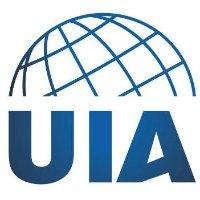
Member(s)
International Association of Lawyers
on 30 April 2020
Established in 1927, and with members in 110 countries, the UIA (International Association of Lawyers) is a global and multi-cultural organization for the legal profession that facilitates professional development, stimulates learning and networking, and promotes the Rule of Law. UIA is open to all the world’s lawyers, both general practitioners and specialists. The UIA’s members […]
2020
France

Member(s)
Barreau de Paris
on 30 April 2020
The Paris Bar was founded under the reign of Louis XIV. Nowadays, it represents around 20 000 lawyers, i.e. nearly half of those practicing in France. Its prime objectives are to organise and structure the legal profession, to strengthen training and adapt it to the deep changes occurring in society and to expand the role […]
France

Member(s)
Kenyan Section of the International Commission of Jurists (ICJ-KENYA)
on 30 April 2020
Mandate and goals : – To develop, strengthen and protect the principles of the rule of law in Kenya. – Develop, maintain and protect the independence of the judiciary and the legal profession in Kenya. – Protect and promote the enjoyment of human rights in Kenya and Africa. Kind of actions : – Legal research […]
Kenya

Member(s)
Parliamentarians for Global Action (PGA)
on 30 April 2020
Parliamentarians for Global Action (PGA), a non-profit, non-partisan international network of over 1,200 legislators in approximately 130 elected parliaments around the globe, aims to promote peace, democracy, the rule of law, human rights, gender equality and population issues by informing, convening, and mobilizing parliamentarians to realize these goals. The network of legislators’ programme of work […]
United States
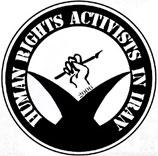
Member(s)
Human Rights Activists in Iran (HRAI)
on 30 April 2020
Human Rights Activists in Iran (also known as HRAI and HRA) is a non-political and non-governmental organization comprised of advocates who defend human rights in Iran. HRAI was founded in 2006 and aims to promote, safeguard and sustain human rights in Iran. The organization keeps the Iranian community and the world informed by monitoring human […]
Iran (Islamic Republic of)

Member(s)
Humanity Diaspo
on 27 March 2024
WOMEN’S HUMANITARIAN AND DEVELOPMENT NGO Humanity Diaspo is a non-profit, humanitarian, development, TechForGood and feminist non-governmental organisation (NGO). Humanity Diaspo is independent of any political, religious or philosophical movement. Humanity Diaspo’s aim, where appropriate in partnership with local entities, is to support people in situations of distress, exile and migration, precariousness and exclusion in all […]
2024
France
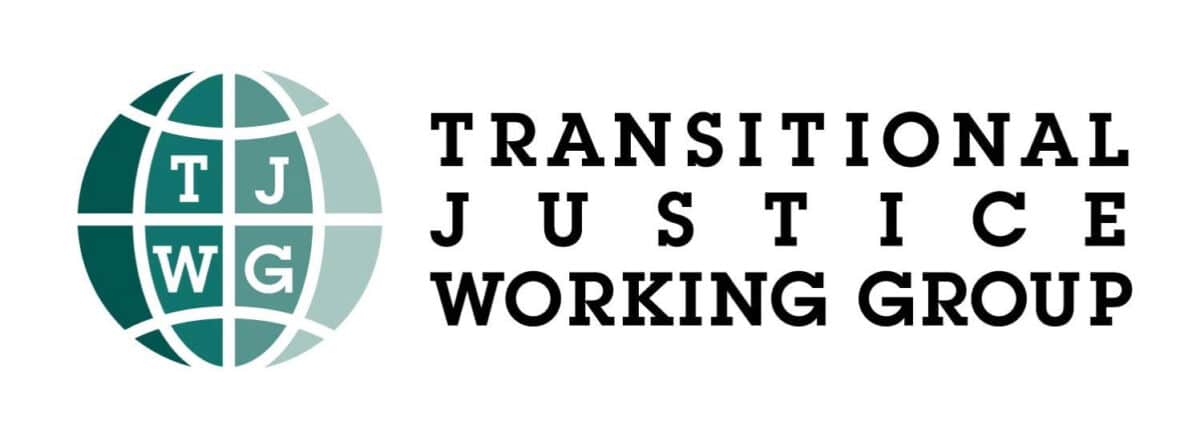
Member(s)
Transitional Justice Working Group (TJWG)
on 15 December 2023
As a human rights documentation NGO, TJWG has published biennial reports on public executions in North Korea based on interviews with North Korean defectors in 2017, 2019 and 2021. TJWG has also been calling for the complete abolition of the death penalty in North and South Korea, which has maintained it in the laws even […]
2023
Republic of Korea
Document(s)
جماربو حنِملاو ق
By She was convicted for infanticide in 1895 and became the only woman ever hanged in New Zealand. He was a young lad from Bluff who was shot for desertion in World War I. Now Minnie Dean and Victor Spencer share their stories with you—just hours before their planned executions by the state., on 1 January 2013
2013
Working with...
More details Download [ - 0 Ko ]
يق |ناسنلإا قوقحل ةيماسلا ةدحتملا مملأا ةيضوفم بتكم / | |2013||externe | | http://www.ohchr.org/Documents/AboutUs/CivilSociety/OHCHRFundsGuide_ar.pdf|OHCHR-2013|Academic report|International law, Networks, |
en12671|OHCHR Practical Guide for Civil Society: Human Rights Funds, Grants and Fellowships|This Practical Guide – the fourth in the series of practical guides for civil society – provides a brief description of funding sources, grants and fellowships administered by or with the participation of the Office of the United Nations High Commissioner for Human Rights (OHCHR). |Office of the United Nations High Commissioner for Human Rights / | |2013||externe | | http://www.ohchr.org/Documents/AboutUs/CivilSociety/OHCHRFundsGuide_en.pdf|OHCHR-2013|Academic report|International law, Networks, |
en12670|Fighting for Their Lives: Inside the Experience of Capital Defense Attorneys|How do attorneys who represent clients facing the death penalty cope with the stress and trauma of their work? Through conversations with twenty of the most experienced and dedicated post-conviction capital defenders in the United States, Fighting for Their Lives explores this emotional territory for the first time|Susannah Sheffer / Vanderbilt University Press / | |2013|United States|externe | | http://www.susannahsheffer.com/fighting-for-their-lives.html||Book|Country/Regional profiles, |
en12669|Invers Theatre Company presents A Cry Too Far From Heaven”
- Document type Working with...
- Themes list Academic report
Document(s)
Justice Project Pakistan, Pakistanis Imprisoned Abroad Database
By Justice Project Pakistan (JPP), on 7 February 2024
2024
NGO report
Pakistan
More details See the document
Pakistan is counted among the countries that rely heavily on foreign remittances for economic stability and foreign reserves. However, despite its dependence on foreign remittances from migrant workers, Pakistan has done little to protect its vulnerable citizens from landing in foreign jails. As a result, Pakistan has seen a significant increase in the number of prisoners and executions abroad. Inadequate oversight and the lack of proper enforcement of existing protections is a literal death sentence for scores of Pakistanis who simply seek a better life and improved prospects for loved ones by working abroad.
- Document type NGO report
- Countries list Pakistan
Document(s)
The death penalty – Abolition in Europe
By Council of Europe / Peter Hodgkinson / Roger Hood / Michel Forst / Stefan Trechsel / Caroline Ravaud / Hans-Christian Kruger / Philippe Toussaint / Serguei Kovalev / Eric Prokosch / Renate Wohlwend / Roberto Toscano / Roberto Fico / Anatoly Pristavkin / Sergiy Holovatiy, on 8 September 1999
1999
Book
Czech Republic
More details See the document
Europe is the first continent in which the death penalty has been almost completely abolished. The Council of Europe has been Europe’s major defender of abolition and presently requires all countries seeking membership in its ranks to place a moratorium on the death penalty. This collection of texts by major European abolitionists includes voices from countries which have enjoyed abolition for many years, as well as from those where abolition has been a struggle against public opinion. Contributors from governments, universities and NGOs add their voices to that of the Council of Europe, explaining the achievements and the ground still to be covered in attaining total abolition in Europe. An introduction by a world expert on abolition, Roger Hood and a conclusion by Russia’s leading abolitionist Sergey Kovalev makes this volume a moving testament to the battle for abolition of the death penalty, which is already so well advanced in Europe. This collection also contains a detailed explanation of Protocol No. 6 to the European Convention on Human Rights, which deals specifically with abolition of the death penalty, as well as reports on various eastern European countries which have yet to attain complete abolitionist status.
- Document type Book
- Countries list Czech Republic
- Themes list Trend Towards Abolition,
Document(s)
Peculiar Institution: America’s Death Penalty in an Age of Abolition
By David Garland / Belknap Press of Harvard University Press, on 8 September 2020
2020
Book
United States
More details See the document
This book offers a fresh perspective on why the death penalty endures in the United States when so many other countries in the Western world have already abolished it. The book seeks to understand the persistence of the death penalty in the U.S. as a social fact, using sociological, historical and legal analyses to explain the unique and peculiar manner in which the death penalty is applied. Garland concludes that the death penalty has survived in the United States because it is deeply connected to the fundamentally American institutions of local autonomy and popular democracy.
- Document type Book
- Countries list United States
- Themes list Networks,
Document(s)
Change of Heart: Justice, Mercy, and Making Peace with My Sister’s Killer
By Jeanne Bishop / Westminster John Knox Press, on 1 January 2015
2015
Book
United States
More details See the document
Jeanne Bishop has written a new book about her life and spiritual journey after her sister was murdered in Illinois in 1990. Change of Heart: Justice, Mercy, and Making Peace with My Sister’s Killer tells Bishop’s personal story of grief, loss, and of her eventual efforts to confront and reconcile with her sister’s killer. She also addresses larger issues of capital punishment, life sentences for juvenile offenders, and restorative justice. Former Illinois Governor George Ryan said of the book, “When I commuted the death sentences of everyone on Illinois’s death row, I expressed the hope that we could open our hearts and provide something for victims’ families other than the hope of revenge. I quoted Abraham Lincoln: ‘I have always found that mercy bears richer fruits than strict justice.’ Jeanne Bishop’s compelling book tells the story of how devotion to her faith took her face-to-face with her sister’s killer …. She reminds us of a core truth: that our criminal justice system cannot be just without mercy.”
- Document type Book
- Countries list United States
- Themes list Murder Victims' Families,
Document(s)
In the Shadow of Death: Restorative Justice and Death Row Families
By Elizabeth Beck / Oxford University Press / Sarah Britto / Arlene Andrews, on 1 January 2007
2007
Article
United States
More details See the document
The stories of parents, siblings, children, and cousins chronicled in this book-vividly illustrate the precarious position family members of capital offenders occupy in the criminal justice system. They live in the shadow of death, crushed by trauma, grief, and helplessness. In this penetrating account of guilt and innocence, shame and triumph, devastating loss and ultimate redemption, the voices of these family members add a new dimension to debates about capital punishment and how communities can prevent and address crime.
- Document type Article
- Countries list United States
- Themes list Networks,
Document(s)
Wounds That Do Not Bind: Victim-based Perspectives on the Death Penalty
By James R. Acker / David R. Karp / Carolina Academic Press, on 1 January 2006
2006
Book
United States
More details See the document
This book examines how family members and advocates for victims address the impact of capital punishment. The book presents the personal stories of victims’ family members and their interactions with the criminal justice system. It also examines the relevant areas of legal research, including the use of victim impact evidence in capital trials, how capital punishment affects victims’ family members, and what is known about addressing the needs of the survivors after a murder.
- Document type Book
- Countries list United States
- Themes list Murder Victims' Families,
Document(s)
Legal Lynching: The Death Penalty and America’s Future
By Bruce Shapiro / Rev. Jesse L. Jackson / Anchor , on 8 September 2020
2020
Book
United States
More details See the document
In this collaborative work, the Jacksons, father (former presidential candidate and founder of the Rainbow Coalition) and son (a congressional representative) with Salon.com editor Shapiro, pursue a nationwide conversation on the issues surrounding the death penalty one that begins with the proposal of a moratorium and could lead to the eventual cessation of capital punishment. This book describes a bureaucratic nightmare involving defense lawyers asleep at trial, vengeance-hungry politicos and a problematic, imperfect justice system in which the handing out of death sentences is skewed, both racially and economically. An objective examination of this penal system would be beneficial to all, say the authors: since the Supreme Court allowed executions to resume in 1976, one in every eight prisoners on death row has been found innocent and released. There are undoubtedly cases, the authors argue, where the proof of innocence didn’t see the light of day in time. Navigating the historical precedents of the death penalty and the reasons why federally mandated executions were restored following a 10-year moratorium imposed in 1967, the authors thoroughly detail legitimate questions regarding what they view as erroneous deterrence theories, scriptural misrepresentation and simple vengeance.
- Document type Book
- Countries list United States
- Themes list Networks,
Document(s)
The International Library of Essays on Capital Punishment, Volume 2 : Abolition and Alternatives to Capital Punishment
By Peter Hodgkinson / Ashgate Publishing, on 8 September 2020
Book
More details See the document
The essays selected for this volume develop conventional abolition discourse and explore the conceptual framework through which abolition is understood and posited. Of particular interest is the attention given to an integral but often forgotten element of the abolition debate: alternatives to capital punishment. The volume also provides an account of strategies employed by the abolition community which challenges tired methodologies and offers a level of transparency previously unseen. This collection tackles complex but fundamental components of the capital punishment debate using empirical data and expert observations and is essential reading for those wishing to comprehend the fundamental issues which underpin capital punishment discourse.
- Document type Book
- Themes list Trend Towards Abolition, Death Penalty,
Document(s)
The International Library of Essays on Capital Punishment, Volume 1 : Justice and Legal Issues
By Peter Hodgkinson / Ashgate Publishing, on 8 September 2020
Book
More details See the document
This volume provides up-to-date and nuanced analysis across a wide spectrum of capital punishment issues. The essays move beyond the conventional legal approach and propose fresh perspectives, including a unique critique of the abolition sector. Written by a range of leading experts with diverse geographical, methodological and conceptual approaches, the essays in this volume challenge received wisdom and embrace a holistic understanding of capital punishment based on practical experience and empirical data. This collection is indispensable reading for anyone seeking a comprehensive and detailed understanding of the complexity of the death penalty discourse.
- Document type Book
- Themes list Death Penalty,
Document(s)
International Legal Trends and the Mandatory Death Penalty in the Commonwealth Caribbean
By Saul Lehrfreund / Oxford University Commonwealth Law Journal, on 1 January 2001
2001
Article
More details See the document
Until the landmark decision of the Eastern Caribbean Court of Appeal in Hufhes and Spense v The Queen, the convetional wisdom was that the mandatory imposition of the death penalty could not be challenged in Commonwealth Caribbean countries as unconstitutional and that, in any event, the savings clauses contained in the constitutions would prevent any such challenge. As a consequence, the constitutional courts in the Commonwealth Caribbean are now being asked to consider a number of specific issues in relation to the mandatory death penalty: first, whether it is constitutional; and second, whether any chanllenges to the mandatory death penalty are barred by the savings clauses found to a varying degree, within each Caribbean constitution of and implications for global and regional developments are highly significant.
- Document type Article
- Themes list Mandatory Death Penalty,
Document(s)
Retribution and Redemption in the Operation of Executive Clemency
By Elizabeth Rapaport / Chicago Kent Law Review, on 1 January 2000
2000
Article
United States
More details See the document
In this Article, my goal is to raise doubts about the adequacy of the neo-retributive theory of clemency and stimulate reappraisal and development of what I will call the “redemptive” perspective. To this end I will present an exposition and critique of neo-retributive theory of clemency.
- Document type Article
- Countries list United States
- Themes list Retribution, Clemency,
Document(s)
Averting Mistaken Executions by Adopting the Model Penal Code’s Exclusion of Death in the Presence of Lingering Doubts
By Margery Malkin Koosed / Northern Illinois Law Review, on 1 January 2001
2001
Article
United States
More details See the document
This article considers community views on the risk of mistaken executions and how sentencing juries respond to such risks. It explores the present state of the law surrounding risk-taking regarding lingering or residual doubt, and finds the law in a state of denial. Though the risk may be there, and jurors may see it, this is not something they are directed, or even invited, to consider. Some jurors may deny effect to the risk they see, believing it is not a proper subject of their attention. Others will consider it, yet wonder whether they should. This inconsistent treatment, and dissonance from what the public wants and justifiably expects from its legal system, is largely a product of the United States Supreme Court’s 1988 decision in Franklin v. Lynaugh. Arguably misread, and at least misguided, the Court’s decision on considering lingering or residual doubts about guilt as a mitigating factor at the penalty phase has retarded development of meaningful ways to avert mistaken executions.
- Document type Article
- Countries list United States
- Themes list Networks,
Document(s)
Dead Innocent: The Death Penalty Abolitionist Search for a Wrongful Execution.
By Jeffrey L. Kirchmeier / Tulsa Law Review, on 1 January 2006
2006
Article
United States
More details See the document
This article examines the debate about whether or not an innocent person has been executed in the United States. The article begins by discussing several famous historical claims of wrongful execution, including Sacco & Vanzetti, the Rosenbergs, and Bruno Hauptmann. Then, the article addresses some recent claims of wrongful executions, including the case of Larry Griffin and the impact of a 2006 DNA test in the Roger Coleman case. The article evaluates why some innocence claims attract more attention than others. By recognizing two obstacles in wrongful execution claims and by establishing five lessons for gaining media attention, the article uses its historical analysis to extract strategy lessons for death penalty abolitionists. Finally, the article weighs arguments regarding the pros and cons of an abolitionist strategy that focuses on proving the innocence of executed individuals. The article concludes that wrongful execution claims provide an important argument for abolitionists, but such claims should not be presented as the main or only problem with the death penalty.
- Document type Article
- Countries list United States
- Themes list Innocence,
Document(s)
Condemning the Other in Death Penalty Trials: Biographical Racism, Structural Mitigation, and the Empathic Divide
By Craig Haney / DePaul Law Review, on 1 January 2004
2004
Article
United States
More details See the document
This article analyses racial discrimination in the administration of the death penalty – despite their importance to the critical debate over the fairness of capital punishment – are not able to address the effects of many of the most pernicious forms of racism in American society. In particular, they cannot examine “biographical racism” – the accumulation of race-based obstacles, indignities, and criminogenic influences that characterizes the life histories of so many African-American capital defendants. Second, I propose that recognizing the role of this especially pernicious form of racism in the lives of capital defendants has significant implications for the way we estimate fairness (as opposed to parity) in our analyses of death sentencing. Chronic exposure to race-based, life-altering experiences in the form of biographical racism represents a profoundly important kind of “structural mitigation.” Because of the way our capital sentencing laws are fashioned, and the requirement that jurors must engage in a “moral inquiry into the culpability” of anyone whom they might sentence to die, this kind of mitigation provides a built-in argument against imposing the death penalty on African-American capital defendants. It is structured into their social histories by the nature of the society into which they have been born.
- Document type Article
- Countries list United States
- Themes list Discrimination,
Document(s)
The Failed Failsafe: The Politics of Executive Clemency
By Cathleen Burnett / Texas Journal on Civil Liberties and Civil Rights, on 1 January 2003
2003
Article
United States
More details See the document
This article discusses the role of executive clemency in light of the current political environment. Attending to the political aspects of the capital litigation process gives insight into the trends in the use of executive clemency
- Document type Article
- Countries list United States
- Themes list Clemency,
Document(s)
International Law and the Moral Precipice: A Legal Policy Critique of the Death Row Phenomenon
By David A Sadoff / Tulane Journal of International and Comparative Law, on 1 January 2008
2008
Article
More details See the document
This article provides an in-depth analysis of death row phenomenon.
- Document type Article
- Themes list Death Row Phenomenon,
Document(s)
Mentally Ill Prisoners on Death Row: Unsolved Puzzles for Courts and Legislatures
By Richard J. Bonnie / Catholic University Law Review, on 1 January 2004
2004
Article
United States
More details See the document
This paper focuses on the problems relating to mental illness or other mental disabilities that arise after sentencing, where the underlying values at stake are the dignity of the condemned prisoner and the integrity of the law.
- Document type Article
- Countries list United States
- Themes list Mental Illness, Intellectual Disability,
Document(s)
The Death Penalty in Taiwan: Towards Abolition?
By International Federation for Human Rights (FIDH) / Sharon Hom / Penelope Martin / Siobhan Ni Chulachain, on 1 January 2006
2006
NGO report
More details See the document
This report highlights serious concerns regarding the conditions of detention of prisoners in Taiwan. Although there has been some improvement in conditions in recent years, FIDH and TAEDP report severe problems of overcrowding and inadequate medical treatment for prisoners, requiring urgent attention. In addition, the mission found that the use of shackles, in violation of international standards, is widespread. Prisoners, in particular those on death row, regularly have their legs chained together for 24 hours per day, in violation of the prohibition against cruel, inhuman and degrading treatment. Despite recent reforms to the criminal justice system, FIDH and TAEDP found that serious failings continue to lead to miscarriages of justice. The report highlights persistent problems including discrimination, limited access to legal representation, piecemeal and only partially implemented reforms and unsatisfactory appeals procedures. FIDH and TAEDP found that training and supervision for actors within the system, including police, is grossly inadequate, leading to failures in the collection and preservation of evidence, whilst prosecutors and judges are inclined to “rubber stamp” police findings.
- Document type NGO report
- Themes list Trend Towards Abolition, Death Row Conditions, Country/Regional profiles,
Document(s)
ISOLATION AND DESOLATION CONDITIONS OF DETENTION OF PEOPLE SENTENCED TO DEATH MALAYSIA – Bahasa Melayu
By Carole Berrih, Ngeow Chow Ying, ECPM, ADPAN, on 27 May 2021
2021
NGO report
Death Row Conditions
Malaysia
More details See the document
Isolation and Desolation – Conditions of Detention of People Sentenced to Death in Malaysia is the first ever fact-finding mission report on the conditions of detention of death row prisoners in Malaysia.
It examines the use of death penalty in Malaysia as well as the actual situation of people on death row.
This report is not meant to point fingers but rather to put the facts on the table in a transparent manner and work from there. It is mainly an advocacy tool for all abolitionist stakeholders, from civil society actors to the parliamentarians who will keep fighting for the abolition of the death penalty.
—————————————
Isolation and Desolation – Conditions of Detention of People Sentenced to Death di Malaysia adalah satu-satunya laporan berasaskan misi mengkaji fakta (fact-finding mission) mengenai keadaan-keadaan penahanan bagi banduan-banduan hukuman mati di Malaysia.
Laporan ini mengkaji pelaksanaan hukuman mati di Malaysia dan juga keadaan sebenar orang-orang yang dijatuhkan hukuman mati.
Laporan ini bukan bertujuan untuk menunding jari terhadap mana-mana pihak, tetapi bertujuan untuk memberi pencerahan kepada fakta-fakta yang ditemui dan berusaha ke atasnya. Laporan ini bertujuan utama sebagai alat advokasi kepada semua pihak yang mempunyai kepentingan dalam pemansuhan, bermula dari ahli persatuan kemasyarakatan sehingga ahli parlimen yang akan berusaha berterusan untuk memansuhkan hukuman mati.
- Document type NGO report
- Countries list Malaysia
- Themes list Death Row Conditions
Document(s)
Strengthening death penalty standards
By Penal Reform International, on 1 January 2015
2015
NGO report
More details See the document
Where the death penalty is applied, international law, jurisprudence and practice require that certain minimum standards are applied. The standards include international and regional treaties that are legally binding on states that have ratified them, customary international law that is binding on all states without exception, and non-binding standards and resolutions that nonetheless command the support of the majority of states. International understanding of these minimum standards has continued to evolve in the years since they were drafted, but the documents themselves do not always keep pace. This paper brings together international, regional and national standards, the most recent understandings of relevant experts and appropriate insights from other connected disciplines. It explores possible ways in which international minimum standards could be further strengthened at this time, whether through ECOSOC, the UN Human Rights Council, the UN Commission on Crime Prevention and Criminal Justice, regional bodies or national amendments to laws and policies. In each section, the issue and current practice is described, followed by examples of good practice or suggestions for improvement, finishing with a short list of recommendations for strengthening existing standards. These issues and recommendations are not final, but are intended to provide a point from which discussion can begin.
- Document type NGO report
- Themes list International law, Legal Representation,
Document(s)
Death sentences and executions 2020
By Amnesty International , on 26 May 2021
2021
NGO report
aresfafrruMore details See the document
This report covers the judicial use of the death penalty for the period January to December 2020. As in previous years, information is collected from a variety of sources, including:
– official figures;
– judgements;
– information from individuals sentenced to death and their families and representatives;
– media reports;
– and, for a limited number of countries, other civil society organizations.
Amnesty International reports only on executions, death sentences and other aspects of the use of the death penalty, , such as commutations and exonerations, where there is reasonable confirmation. In many countries governments do not publish information on their use of the death penalty. In China and Viet Nam, data on the use of the death penalty is classified as a state secret. During 2020 little or no information was available on some countries – in particular Laos and North Korea (Democratic People’s Republic of Korea) – due to restrictive state practice.
- Document type NGO report
- Available languages أحكام وعمليات اإلعدام في2020CONDENAS A MUERTE Y EJECUCIONES 2020احکام مرگ و اعدامها۲۰۲۰سالCondamnations à mort et exécutions 2020ГЛОБАЛЬНЫЙ ДОКЛАД СМЕРТНЫЕ ПРИГОВОРЫ И КАЗНИ 2020

